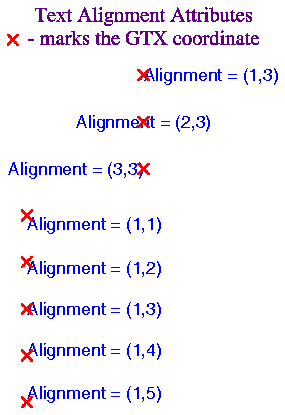
-----------------------------------------------------
Argument | Type | Mode | Dimension
-----------------------------------------------------
CALL GTX (X, | Real | Input |
Y, | Real | Input |
STRING) | Character | Input |
-----------------------------------------------------
-------------------------------------------------------------------------
C Synopsis
#include <ncarg/gks.h>
void gtext(
const Gpoint *text_pos, /* text position */
const char *char_string /* character string */
);
------------------------------------------------------------------------
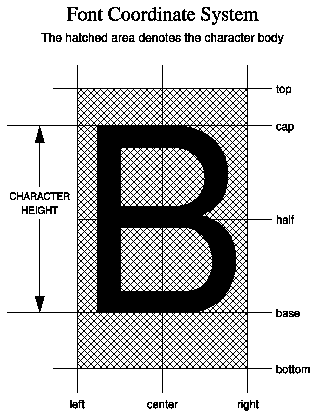
A box that consists of the concatenated character bodies of a series of horizontal or vertical characters defines a text extent rectangle. Text path and alignment attributes relate to the text extent rectangle.
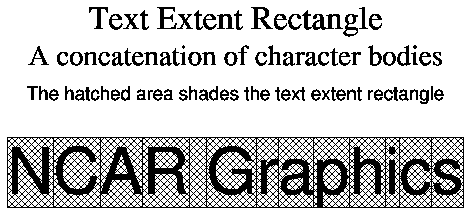
--------------------------------------------------
Argument | Type | Mode | Dimension
--------------------------------------------------
CALL GSTXP (TXP) | Integer | Input |
--------------------------------------------------
Normal text writing (horizontal direction moving toward the right) defaults are a character up vector of (0.,1.) and text path of right.
----------------------------------------------------------------------
C Synopsis
#include <ncarg/gks.h>
void gset_text_path(
Gtext_path text_path /* text path */
);
----------------------------------------------------------------------
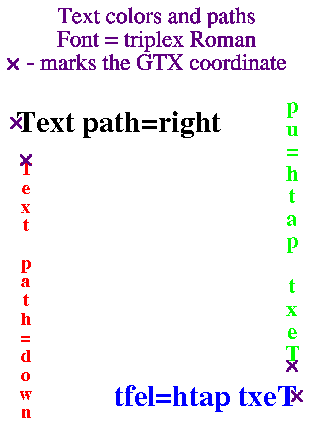
---------------------------------------------------
Argument | Type | Mode | Dimension
---------------------------------------------------
CALL GSTXAL (TXALH, | Integer | Input |
TXALV) | Integer | Input |
---------------------------------------------------
------------------------------------------------ Text Path | Normal Horizontal | Normal Vertical ------------------------------------------------ RIGHT | LEFT | BASE LEFT | RIGHT | BASE UP | CENTER | BASE DOWN | CENTER | TOP ------------------------------------------------
--------------------------------------------------------------------------
C Synopsis
#include <ncarg/gks.h>
void gset_text_align(
const Gtext_align *text_align /* text alignment */
);
--------------------------------------------------------------------------
---------------------------------------------------
Argument | Type | Mode | Dimension
---------------------------------------------------
CALL GSTXFP (FONT, | Integer | Input |
PREC) | Integer | Input |
---------------------------------------------------
When plotting to a PostScript workstation all GKS fonts are mapped onto an equivalent PostScript font if possible.
---------------------------------------------------------------------------
C Synopsis
#include <ncarg/gks.h>
void gset_text_font_prec(
const Gtext_font_prec *text_font_prec /* text font and prec */
);
---------------------------------------------------------------------------
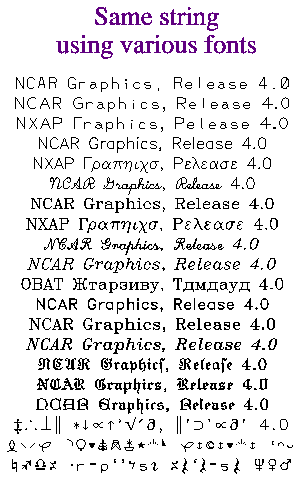
------------------------------------------------
Argument | Type | Mode | Dimension
------------------------------------------------
CALL GSCHH (CHH) | Real | Input |
------------------------------------------------
----------------------------------------------------------------------
C Synopsis
#include <ncarg/gks.h>
void gset_char_ht(
Gdouble char_ht /* character height */
);
----------------------------------------------------------------------
See Figure 14 for an example of character
heights and up vectors.
-------------------------------------------------
Argument | Type | Mode | Dimension
-------------------------------------------------
CALL GSCHSP (CHSP) | Real | Input |
-------------------------------------------------
A character spacing of zero concatenates character bodies contiguously. A positive value leaves space between the successive characters. A negative value causes successive characters to overlap.
-----------------------------------------------------------------------
C Synopsis
#include <ncarg/gks.h>
void gset_char_space(
Gdouble char_space /* character spacing */
);
-----------------------------------------------------------------------
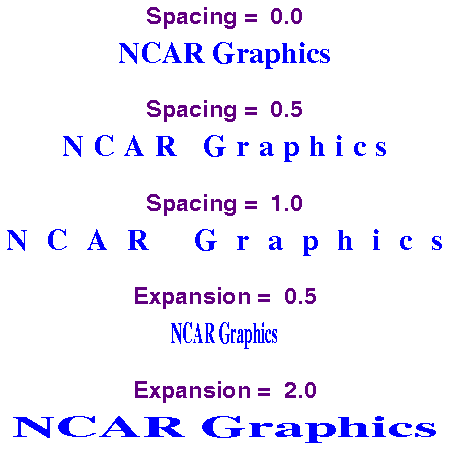
-------------------------------------------------
Argument | Type | Mode | Dimension
-------------------------------------------------
CALL GSCHUP (CHUX, | Real | Input |
CHUY) | Real | Input |
-------------------------------------------------
The coordinate (CHUX, CHUY), relative to (0,0), establishes a vector direction which will be perpendicular to the horizontal centerline of the character string to be drawn. Thus, (CHUX, CHUY) equals (0., 1.) implies normal character positioning in which the character centerline is horizontal and the top of the character is up.
--------------------------------------------------------------------------
C Synopsis
#include <ncarg/gks.h>
void gset_char_up_vec(
const Gvec *char_up_vec /* character up vector */
);
--------------------------------------------------------------------------
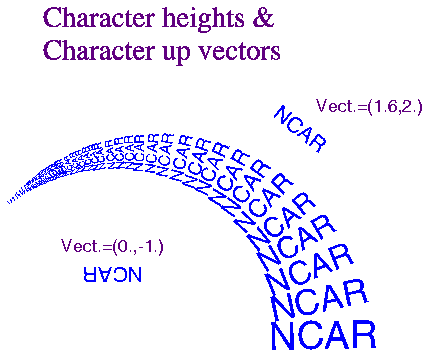
-------------------------------------------------
Argument | Type | Mode | Dimension
-------------------------------------------------
CALL GSCHXP (CHXP) | Real | Input |
-------------------------------------------------
--------------------------------------------------------------------------
C Synopsis
#include <ncarg/gks.h>
void gset_char_expan(
Gdouble char_expan /* character expansion factor */
);
--------------------------------------------------------------------------
See Figure 13
for examples of character spacings and expansion factors.
---------------------------------------------------
Argument | Type | Mode | Dimension
---------------------------------------------------
CALL GQTXP (ERRIND, | Integer | Output |
TXP) | Integer | Output |
---------------------------------------------------
--------------------------------------------------------------------------
C Synopsis
#include <ncarg/gks.h>
void ginq_text_path(
Gint *err_ind, /* error indicator */
Gtext_path *text_path /* current text path */
);
--------------------------------------------------------------------------
----------------------------------------------------
Argument | Type | Mode | Dimension
----------------------------------------------------
CALL GQTXAL (ERRIND, | Integer | Output |
TXALH, | Integer | Output |
TXALV) | Integer | Output |
----------------------------------------------------
--------------------------------------------------------------------------
C Synopsis
#include <ncarg/gks.h>
void ginq_text_align(
Gint *err_ind, /* error indicator */
Gtext_align *text_align /* text alignment */
);
--------------------------------------------------------------------------
----------------------------------------------------
Argument | Type | Mode | Dimension
----------------------------------------------------
CALL GQTXFP (ERRIND, | Integer | Output |
FONT, | Integer | Output |
PREC) | Integer | Output |
----------------------------------------------------
--------------------------------------------------------------------------
C Synopsis
#include <ncarg/gks.h>
void ginq_text_font_prec(
Gint *err_ind, /* error indicator */
Gtext_font_prec *font_prec /* font and precision */
);
--------------------------------------------------------------------------
---------------------------------------------------
Argument | Type | Mode | Dimension
---------------------------------------------------
CALL GQCHH (ERRIND, | Integer | Output |
CHH) | Real | Output |
---------------------------------------------------
---------------------------------------------------------------------
C Synopsis
#include <ncarg/gks.h>
void ginq_char_ht(
Gint *err_ind, /* error indicator */
Gdouble *char_ht /* character height */
);
---------------------------------------------------------------------
----------------------------------------------------
Argument | Type | Mode | Dimension
----------------------------------------------------
CALL GQCHSP (ERRIND, | Integer | Output |
CHSP) | Real | Output |
----------------------------------------------------
------------------------------------------------------------------------
C Synopsis
#include <ncarg/gks.h>
void ginq_char_space(
Gint *err_ind, /* error indicator */
Gdouble *char_space /* character spacing */
);
------------------------------------------------------------------------
----------------------------------------------------
Argument | Type | Mode | Dimension
----------------------------------------------------
CALL GQCHUP (ERRIND, | Integer | Output |
CHUX, | Real | Output |
CHUY) | Real | Output |
----------------------------------------------------
------------------------------------------------------------------------
C Synopsis
#include <ncarg/gks.h>
void ginq_char_up_vec(
Gint *err_ind, /* error indicator */
Gvec *char_up_vec /* character up vector */
);
------------------------------------------------------------------------
----------------------------------------------------
Argument | Type | Mode | Dimension
----------------------------------------------------
CALL GQCHXP (ERRIND, | Integer | Output |
CHXP) | Real | Output |
----------------------------------------------------
-----------------------------------------------------------------------
C Synopsis
#include <ncarg/gks.h>
void ginq_char_expan(
Gint *err_ind, /* error indicator */
Gdouble *char_expan /* expansion factor */
);
-----------------------------------------------------------------------